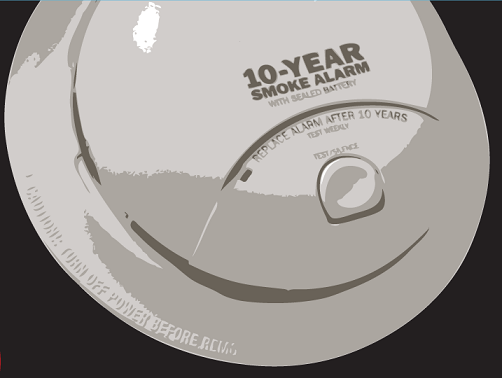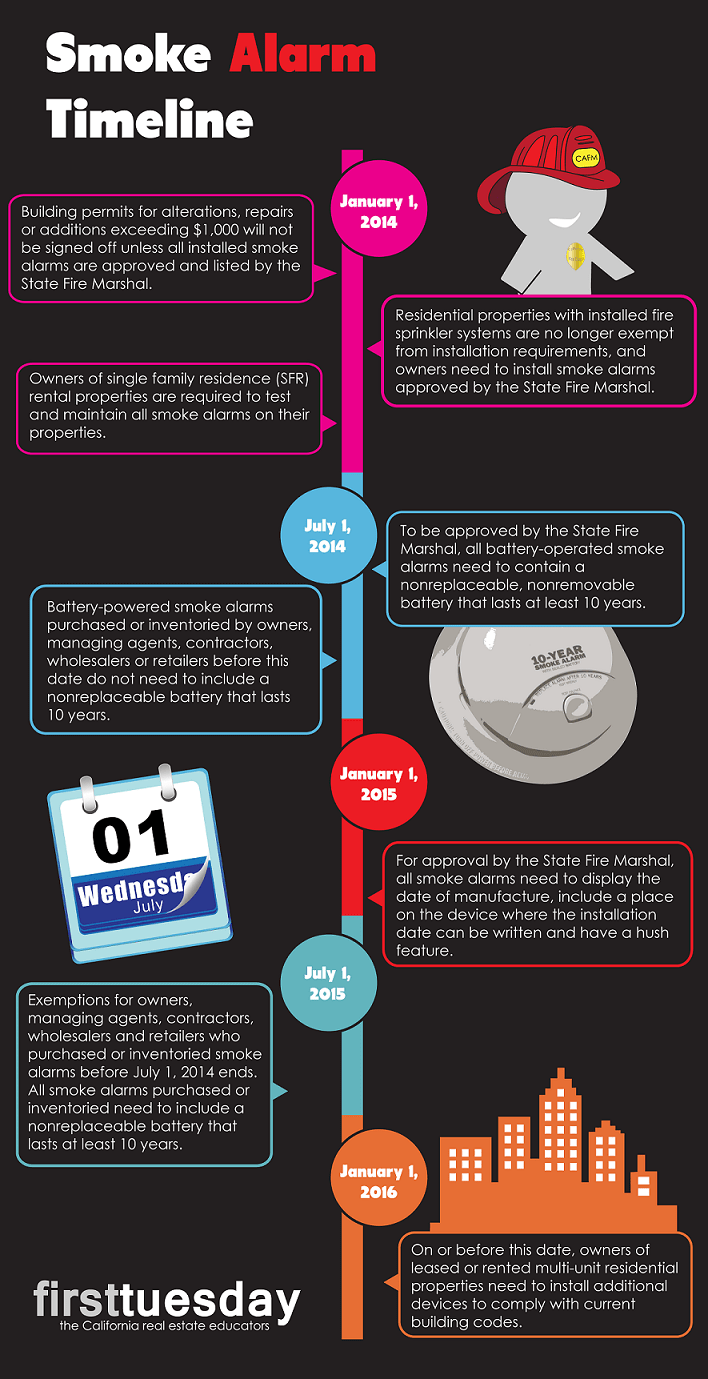Where there’s smoke, there’s fire — and, if you’re compliant with the law, a smoke detector, too! Read on to ensure you and your clients comply with new and existing rules controlling smoke alarms in residential properties.
A part of all residential properties
Smoke alarms approved by the State Fire Marshal are required to be placed in all residential properties in California. The State Fire Marshal lists all approved smoke alarms. [Calif. Health & Safety Code §13113.7]
Beginning July 1, 2014, the State Fire Marshal required all battery-operated smoke alarms to contain a non-replaceable battery that lasts at least ten years. [Health & S C §13114(b)]
Beginning January 1, 2015, the State Fire Marshal required all smoke alarms (battery-powered, or powered by electricity) to:
- display the date of manufacture;
- provide a place where the date of installation can be written; and
- incorporate a hush feature.
Operable hardwired and battery-operated smoke alarms which were approved and listed when they were installed don’t need to be replaced immediately. [Health & S C §§13113.7(a)(4); 13113.7(d)(3)]
Editor’s note — Local ordinance may require replacement sooner. [Health & S C §13113.7(a)(4)]
When an existing smoke alarm no longer works, the replacement smoke alarm is to meet all new requirements.
Smoke alarms are not required if a State Fire Marshal-approved fire alarm system with smoke detectors is installed on the property. An existing fire sprinkler system no longer exempts a residential property owner from smoke alarm installation requirements. [Health & S C §13113.7(a)(5)]
Violations of smoke alarm rules incur a maximum fine of $200 for each offense. [Health & S C §13113.7(e)]
Smoke alarm rules for rentals
If your client owns a multi-unit residential property or a single family residence (SFR) rental property, they are required to install, maintain and test smoke alarms on their property. [Health & S C §13113.7(d)(2)]
Owners (or property managers, as owners’ agents) are required to ensure smoke alarms are operable when a new tenancy is created. [Health & S C §13113.7(d)(2)(B)]
To ensure safe conditions, residential rental and lease agreement forms include a provision requiring the landlord to comply with all safety ordinance and regulations, including smoke alarm law. [See RPI Forms 550 §7.3 and 551 §7.2]
However, tenants are responsible for notifying the owner or property manager if the smoke alarm becomes inoperable. The owner is not in violation of smoke alarm requirements if they are unaware of a malfunction in the smoke alarm after the tenant is given possession. [Health & S C §13113.7(d)(2)(B)]
An owner responds to a tenant’s notification of an inoperable smoke alarm in their unit by correcting the defect. 24-hour written notice is given to the tenant before the owner or their agent enters and performs the repairs. Repairs are performed only during business hours. [Health & S C §13113.7(d)(2); see RPI Form 567]
Additionally, owners of any residential rental property are to install additional smoke alarms to ensure devices are located in accordance with current local building standards. [Health & S C §13113.7(d)(3)]
In California, smoke alarms are to be installed on each floor, in each sleeping room and in the immediate vicinity outside of the bedrooms (i.e. a hallway). Proper smoke alarm placement also depends on local ordinance. [Calif. Building Code §R314.3]
Smoke detector laws don’t mandate the frequency of owner inspections. However, landlords have a duty to inspect the premises upon entry for any purpose. Inspections need not be thorough, but landlords are liable for any dangerous condition that is observable by a reasonable person. [Mora v. Baker Commodities, Inc. (1989) 210 CA3d 771]
Thus, if a smoke alarm defect can be reasonably ascertained visually during a landlord’s visit to the unit, the landlord needs to repair or replace the device.
Enforcement on a building permit
Additionally, smoke alarm enforcement is triggered when a residential property owner seeks a building permit for alterations, repairs or additions costing more than $1,000. Building permits will not be issued until the owner has provided proof that State Fire Marshal-approved smoke alarms are in place and operable. [Health & S C §13113.7(a)(2)]
This does not require the owner to replace any older, operating smoke alarms, but older smoke alarms are required to have been approved by the State Fire Marshal at the time of installation. [Health & S C §13113.7(a)(4)]
Enforcement on a transfer of a single family residence
Enforcement of smoke alarm rules is also triggered on the transfer of a single family residence (SFR). Sellers certify the property is in compliance with smoke alarm rules on the Transfer Disclosure Statement (TDS). The certification — TDS — is handed to the buyer as soon as practicable (ASAP) before the seller enters into a purchase agreement or counteroffer. [Health & S C §13113.8(b)-(c); see RPI Form 304]
Related article:
This article was previously posted in 2014, and has been updated.
Check out our smoke alarm timeline below for a quick snapshot of when these laws go into effect (click to expand):















November 2019 YEARS after the effective date of the law: Why are 9v non-sealed non-10 year battery smoke detectors still sold in stores and delivered by big box retailers?
What about carbon monoxide detectors?
Hi, my landlord hasn’t responded to me about installing a smoke detector in my room because it’s missing one. What do I do?
install it your self… they are cheap, don’t put your life in someone else’s hands….yes it is the landlords responsibility but so what…and if you die from smoke inhalation…well that can get pretty expensive…if you think about it you have more to lose than your landlord…you will be dead he wont..the law should be changed…tenants should be responsible for these sorts of things…I mean come on we all need to look both ways before we cross the street…. But as it stands your landlord should do it because yes you will be dead but he will be in the cross hairs for allowing you to live in a unit without smoke detectors….
Request to the city hall for a housing inspection and the city hall will order to your landlord to install it.
Yeah and expect a 60 days notice soon after as what I would do. Pay for it and ask for landlord to reimburse or deduct it from rent and send copy of receipt with rent check.
I am a renter of roommate status, in a three story home, with the owner occupant and a total of three rental tenants. There are no smoke detectors. I required one in my room and the hallway to my room and the basement where there is a lot of debris as well as a dryer that could cause a fire. So far, nothing has been done. I am afraid to put my “demand” in writing because I fear retaliation (on a month to month basis). What is my protection under either California or federal law?
Thats called retaliation and a landlord can and will be sued by the tenant in small claims. You need to send the landlord the bill and if they are looking to evict afterwards. Than called the DFEH and make your claim which will put a stop on the landlords orders to evict you.